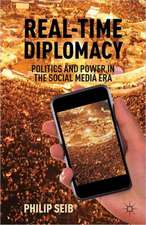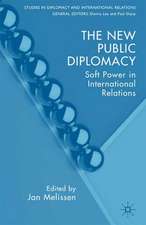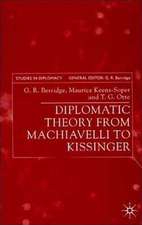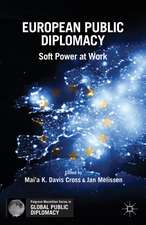Transforming Global Governance with Middle Power Diplomacy: South Korea's Role in the 21st Century
Editat de Sook Jong Leeen Limba Engleză Hardback – 29 iun 2016
This book examines South Korea’s recent strategic turn to middle power diplomacy, evaluating its performance so far in key areas of security, maritime governance, trade, finance, development assistance, climate change, and cyber space. In particular, the authors pay special attention to how South Korea’s middle power diplomacy can contribute to making the U.S.-China competition in East Asia benefit Korea.
The contributors discuss the opportunities and limits of this middle power diplomacy role, exploring how Korea can serve as a middleman in Sino-Japanese relations, rather than as a US ally against China; use its rich trade networks to negotiate beneficial free trade agreements; and embracing its role as a leader in climate change policy, along with other topics. This book is a must read for foreign policy officials and experts who engage in the Asia-Pacific region, rekindling the academic study of middle powers whose influence is only augmenting inour increasingly networked twenty-first century world.
Preț: 385.84 lei
Nou
Puncte Express: 579
Preț estimativ în valută:
73.84€ • 76.28$ • 61.45£
73.84€ • 76.28$ • 61.45£
Carte tipărită la comandă
Livrare economică 25 martie-08 aprilie
Preluare comenzi: 021 569.72.76
Specificații
ISBN-13: 9781137596598
ISBN-10: 1137596597
Pagini: 195
Ilustrații: IX, 173 p.
Dimensiuni: 148 x 210 x 15 mm
Greutate: 0.36 kg
Ediția:1st ed. 2016
Editura: Palgrave Macmillan US
Colecția Palgrave Macmillan
Locul publicării:New York, United States
ISBN-10: 1137596597
Pagini: 195
Ilustrații: IX, 173 p.
Dimensiuni: 148 x 210 x 15 mm
Greutate: 0.36 kg
Ediția:1st ed. 2016
Editura: Palgrave Macmillan US
Colecția Palgrave Macmillan
Locul publicării:New York, United States
Cuprins
1. South Korea Aiming to Be an Innovative Middle Power.- 2. East Asian Security and South Korea’s Middle Power Diplomacy.- 3. U.S. Rebalancing Strategy and South Korea’s Middle Power Diplomacy.- 4. China’s Perception of and Strategy for the Middle Powers.- 5. East Asian Maritime Disputes and South Korea’s Middle Power Diplomacy.- 6. The Role of South Korea in the Making of a Regional Trade Architecture: Convening, Bridging, and Designing FTA Networks.- 7. South Korea’s Climate Change Diplomacy: Analysis Based on the Perspective of ‘Middle Power Diplomacy'.- 8. South Korea’s Middle Power Roles: Implications for Emerging Middle Powers.
Notă biografică
Sook-Jong Lee is the President of the East Asia Institute and a professor of public administration at Sungkyunkwan University. Previously, Dr. Lee was a research fellow at the Sejong Institute, a visiting fellow at the Brookings Institution, and a Lecturer at the School of Advanced International Studies (SAIS) at Johns Hopkins University. Dr. Lee received her masters and doctorate in sociology from Harvard University.
Textul de pe ultima copertă
This book examines South Korea’s recent strategic turn to middle power diplomacy, evaluating its performance so far in key areas of security, maritime governance, trade, finance, development assistance, climate change, and cyber space. In particular, the authors pay special attention to how South Korea’s middle power diplomacy can contribute to making the U.S.-China competition in East Asia benefit Korea.
The contributors discuss the opportunities and limits of this middle power diplomacy role, exploring how Korea can serve as a middleman in Sino-Japanese relations, rather than as a US ally against China; use its rich trade networks to negotiate beneficial free trade agreements; and embracing its role as a leader in climate change policy, along with other topics. This book is must read for foreign policy officials and experts who engage in the Asia-Pacific region, rekindling the academic study of middle powers whose influence is only augmenting in our increasingly networked twenty-first century world.










